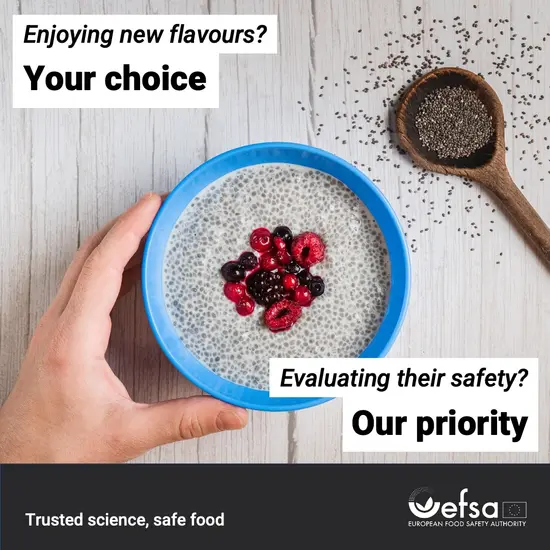Novel foods
What are novel foods and are they safe for me to eat?
Bananas, potatoes, tomatoes and rice all came to Europe once as novel foods. Throughout history, we have continued to add new types of food to our diets adopted from all corners of the planet. Think of spices and tropical fruits, once a novelty for Europeans and highly prized for their flavours, now commonplace in our kitchens.
We have always been on the lookout for new tastes and sources of nutrients. With the world ever more globalised, there are more choices than ever when it comes to what we eat.
All novel foods must go through an authorisation process, including a thorough safety assessment, before they may be approved for sale in the EU.
What makes novel food different to other foods or ingredients?
Food is considered novel in the EU if it was not widely consumed before May 1997. The definition includes traditional foods from other countries, new food ingredients and food from new sources such as algae and microorganisms.
Novel food also includes food produced by new technologies such as nanotechnology, cell culture and UV-treatment.
Examples include:
- chia seeds
- menaquinone (new source of vitamin K)
- mung bean protein
- Antarctic krill oil (rich in Omega-3 fatty acids)
- noni juice
- UV-treated milk and bread
Thanks to the diversity of the world, our interaction with other cultures, and innovation, novel foods will continue trying to make their way onto our tables, providing new dietary choices. With our science-based safety assessments, we check whether these new foods are safe.
Ermolaos Ververis, a food chemist working at EFSA.
Are they safe?
All novel foods are carefully assessed before they can be sold on the European market. Food businesses must send applications containing information about the novel food such as the production method, the composition, and proposed uses as well as mandatory safety studies.
Scientists at EFSA carry out a risk assessment before European legislators decide on marketing authorisations and labelling.
EFSA’s scientists assess potential health risks such as allergens and toxicological effects. They also check to ensure that if a novel food is intended to replace another food, it does not differ in a way that would be nutritionally disadvantageous for the consumer.
During the assessment EFSA may also request additional studies from food businesses, if needed, to confirm the safety of the food.
What this means for you
All novel foods are regulated to ensure they are:
- Safe for consumers
- Properly labelled so as not to mislead consumers
- Not nutritionally disadvantageous (compared to food they intend to replace in the diet).
This means if you decide to try something new, you can be sure it’s safe!




































